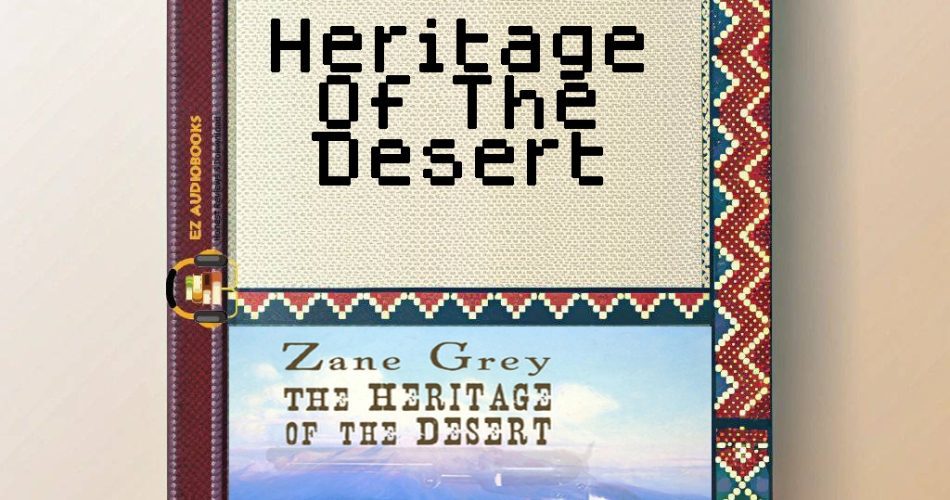Audiobook Sample
Listen to the sample to experience the story.
Please wait while we verify your browser...
- Title: Heritage Of The Desert
- Author: Zane Grey
- Narrator: Richard Kilmer
- Length: 09:27:00
- Version: Abridged
- Release Date: 01/01/2011
- Publisher: LibriVox
- Genre: Fiction & Literature, Western
- ISBN13: SABLIBX978322
The first time I heard Richard Kilmer’s gravelly baritone breathe life into Zane Grey’s desert landscape, I was transported back to that moonlit night in Chile’s Atacama – where the boundary between story and landscape dissolved completely. Heritage Of The Desert isn’t just an audiobook; it’s a saddle creaking beneath you, the taste of alkali dust, the ache of forbidden love under a merciless sun. Grey’s 1910 western classic finds perfect vocal embodiment in Kilmer’s performance, available as a free download from LibriVox that feels like discovering a water source in arid country.
Grey’s narrative follows Jack Hare, a greenhorn cowboy saved from certain death by Mormon rancher August Naab, only to be plunged into conflicts over water rights, cattle rustlers, and his impossible love for Mescal – a half-Navajo shepherdess promised to Naab’s son. Listening to Kilmer navigate these tensions, I recalled evenings in Oaxaca where storytellers made ethical dilemmas as tangible as the mezcal in our glasses. The narrator’s ability to distinguish characters through subtle vocal shifts – Naab’s patriarchal rumble, Mescal’s musical cadence, Hare’s earnest staccato – creates an oral tapestry richer than Grey’s sometimes problematic portrayals of Native characters.
The audiobook’s greatest strength lies in its environmental immersion. When Kilmer describes “the red gap in the black belt of lava” or “the white-hot sky vibrating over the desert,” you don’t just hear it – you feel the heat waves distorting the horizon. Having traversed similar landscapes from Arizona to Patagonia, I recognized the authenticity in Grey’s nature writing, even when his cultural depictions show their 1910 limitations. Kilmer’s pacing during action sequences – particularly the climactic gun battle – had me gripping my steering wheel like it was a saddle horn, heart pounding as if pursued by Snap Naab’s gang.
Critically, the production shows its LibriVox origins with occasional uneven audio quality, but this rawness oddly suits the material. There’s something fitting about hearing a frontier tale with the slight echo of a home recording – it mirrors the roughness of Grey’s prose before editors polished his later works. The 7.5-hour runtime unfolds like a long ride through canyon country, with Kilmer’s voice your only companion through stretches of introspection punctuated by violent encounters.
Compared to Grey’s better-known Riders of the Purple Sage, this earlier work shows the author refining his signature themes: water as lifeblood and moral compass, the West as crucible for transformation, love as both salvation and damnation. Kilmer’s interpretation highlights these elements more subtly than later Hollywood adaptations, letting Grey’s lush descriptions of “the lonely, luminous, silent desert” take center stage.
For contemporary listeners, the novel requires contextual understanding – its portrayal of Navajo culture reflects period prejudices, though Mescal emerges as surprisingly complex for early western fiction. Kilmer navigates these passages with neutral dignity, neither amplifying nor excusing the text’s limitations. His restrained delivery during problematic moments allows modern audiences to appreciate Grey’s landscape lyricism while recognizing the cultural blind spots common to his era.
The audiobook format particularly enhances Grey’s strength at creating atmospheric tension. When Kilmer reads passages like “the night wind moaned through the canyon with a sound like a lost soul,” the stereo effect makes the hair on your neck rise. I found myself pausing the recording during Mescal’s shepherding scenes, just to hear the imagined echo of sheep bells fading into desert silence – an experience that reminded me of lying awake in a Navajo hogan years ago, listening to similar sounds drift across the mesa.
While not as psychologically complex as Oakley Hall’s Warlock or as meticulously researched as Louis L’Amour’s work, Grey’s novel thrives in audio form because Kilmer captures its elemental power. The narrator makes you feel Hare’s transformation from Eastern weakling to desert-hardened man as a visceral journey, his voice deepening in timbre as the character grows. Their final confrontation with rustlers carries genuine weight because we’ve heard every grueling mile that brought them there.
May your own journeys – through landscapes and literature – be equally transformative. Until the next campfire tale, Marcus
Marcus Rivera

